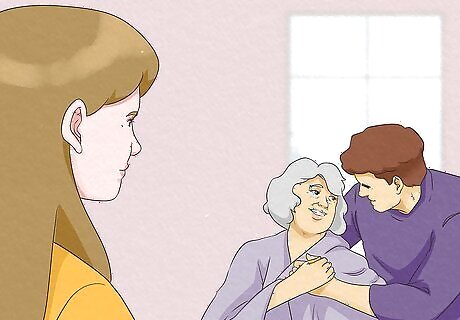
views
Observing the Person’s Behaviors

Notice if the person is reliable and honest. You should consider the individual traits of your partner or a person who may be a partner to you in the future. One of the key traits you should look for is reliability and honesty. Ask yourself, “Does this person appear reliable and honest?” and “How does this person demonstrate they are reliable and honest?” For example, you may notice that the person shows up when they say they are going to and does not flake out at the last minute on plans you have together. You may also notice that the person does not cheat on tests or exams, even though they might get away with it. This is an indication that they have a strong moral compass and will not simply take the easy route if it means less work for them.

Consider if the person is supportive of you. A loyal partner will honor your individual traits and skills. You should note if the person shows clear support for your interests and goals. Having a partner who is supportive also shows that they are interested in you as a person and care about your future. For example, you may notice that the person always shows up to your games or matches, or makes every effort to be there. Maybe the person takes on extra duties at home so you have time to study for an exam or time to spend on an important project for work. You may also note that the person tells you directly, “I support you and think what you are doing is great,” or, “I believe in you and your abilities. I want to support you in every way I can.”

Determine if the person is emotionally mature. Emotional maturity is a key trait in a relationship, as it indicates that the person is comfortable in their own skin and willing to be there for you emotionally. Being emotionally mature is a good indicator of loyalty and a good sign that your relationship is healthy. For example, an emotionally mature person will be a good listener and put their needs aside to focus on your needs. They will also be comfortable talking about their feelings, wants, and needs with you and be willing to ask for what they want. An emotionally mature person will also be able to make their own decisions and choices without the influence of others. This is a good trait to have as it shows that they can be accountable for their own choices and be responsible with their decisions.

Determine what "loyalty" means to you. Take some time to think about what loyalty looks like to you; look at the obvious things as well as more subtle situations. Does loyalty mean not cheating (emotionally/ physically/both)? Not talking about private matters with others? Showing up to company events? Collaborating on financial decisions prior to purchases? Checking in before committing to plans? What exactly are you expecting from a partner when you use the term "loyal"? You need to have a clear idea of what these behaviors are in order to look for them in others and have a conversation about them.
Examining How You Interact Together

Talk to your partner about what is important to you. Instead of assuming your definition of loyalty matches your partner's, have a discussion about which behaviors indicate loyalty to you. For instance, your partner showing up to your soccer match may be a demonstration of loyalty in your eyes. But maybe your partner doesn't mind if you don't go to their events, so they don't realize how important it is to you that they go to your events. Take the time to express which behaviors are important and which meet your needs for a relationship, and allow your partner to do the same.

Look at how you handle conflict. When trying to determine if you have chosen a loyal partner, you should consider how you handle conflict in your relationship. Are you both able to talk about any issues or problems you may be having? Can you speak openly about how you feel with your partner? Having good communication skills and listening skills are important aspects of a fulfilling, loyal relationship. You may also think about how your partner handles conflict between you. Do they get upset and shut down? Are they able to talk to you about their feelings and concerns? Note how they react in difficult or challenging situations and whether you feel they react in a healthy, honest way.

Consider if you trust each other. You should also take a moment to consider if you can place your complete trust in that person and if they can do the same with you. Ask yourself, “Can I trust in this person completely?” If the answer is “no” or “maybe,” you should consider why you are hesitant to trust your partner. You may write down why you cannot answer “yes” to the question and consider if the reasons for “no” are not fixable or able to addressed with your partner. For example, you may write down that you cannot trust your partner because they are not honest with you about their feelings. You may then consider talking with your partner about being more open and honest with their feelings. Communicating with them about your concerns may help you learn how to trust them in the future. Reader Poll: We asked 581 wikiHow readers about what factors are essential in a committed relationship, and 64% of them agreed that shared trust and loyalty between partners is most important. [Take Poll]

Think about how your relationship has progressed. You should also look at the big picture and consider your relationship as a whole. Think about where your relationship started and where it is at now. Does it feel like you and your partner have grown and matured together? Does your relationship feel stronger now than it did in the past? If your relationship is healthy, your sense of loyalty for your partner should expand over time and you should feel you can trust them after so much time together. If you feel your relationship has not developed as much as you hoped it would in terms of trust and loyalty, you may decide to talk to your partner about how you are feeling. You should consider what you can both do to prioritize your relationship and develop a stronger sense of loyalty.
Watching For Red Flags

Look at how the person treats their friends and family. You can tell a lot about a person’s loyalty based on how they treat those they love and those closest to them. Consider if your partner is loyal and honest with their family and their friends or if they are flaky and unreliable. A loyal person will treat those closest to them with respect, admiration, and consideration. It may be a red flag if your partner is not as supportive or considerate of those closest to them as they could be. For example, you should consider if the person treats their friends with loyalty and consideration. Do they try to support their friends in their endeavors? Do they try to spend time with their friends and follow through on their commitments to their friends? You should also consider how your partner treats their family. Though they may not be close to their family, they may still go out of their way to help a family member in need or try to support a family member who is suffering or having a hard time.

Determine if the person follows through on their commitments. You should also consider if the person is able to commit to things and follow through on their word. This is an important indicator of loyal and reliable behavior. You want a partner who is not flaky or unable to commit to anything, as it could be a sign they have a hard time being loyal to those around them. For example, you may notice that the person is good at texting people back and responding to messages from friends who are in need. They may also make plans with friends or coworkers and then make sure they always show up and put in an effort. You may also note that the person is able to commit to short-term plans and long-term plans with you. Perhaps you make dinner plans for next week and the person makes sure they can make it. You may also plan a vacation in a few months and note that the person makes sure they are able to go with you before they commit.

Check that the person sets boundaries with others. You should pay attention to how the person interacts with others and ensure they are good at setting boundaries. Having boundaries is an important part of being loyal, as you want a partner who is able to be friendly but not too flirty with others. If the person tends to get too close to friends or coworkers and is not good at saying "no," this may be a red flag. Your partner should be aware of when they are stepping over the line and possibly breaking your trust by spending too much time with someone else or by devoting too much emotion to another person. If you express concern about their relationship with someone else, they should listen to your concerns and try to show you that you have nothing to worry about. For example, you should note if your partner is able to have relationships with the opposite sex, or the sex they are attracted to, without ending up getting too flirty or too close. This could be someone they work with or a close friend. They should be able to maintain friendly, platonic relationships with others and also devote enough time to your relationship.

Note if the person has cheated before. You should also consider if your partner has cheated in the past with other partners. A person who has a history of cheating may have difficulty with commitment and monogamy. You should think about if you are concerned about your partner's loyalty because of their track record with other partners and view this as a red flag. If you have some concerns about your partner's loyalty, you should speak to them about trust and commitment. Your partner should try to assure you that they can be loyal to you and show you that they can be loyal. You may also ask them to show you that they can be trusted and will not cheat on you like they did with their other partners in the past.




















Comments
0 comment